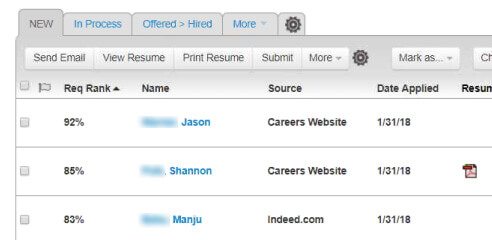Virtually all large employers utilize an applicant tracking system (ATS) to manage their simultaneous job openings and high volumes of applicants. These systems make it possible for recruiters and hiring managers to comb through hundreds or thousands of applicants, but they’re not without their drawbacks. Resumes and applications that aren’t optimized for these systems might never see the light of day in what many job seekers call the “resume black hole.”
Read more: What is an applicant tracking system?
If you’re on a job hunt, one ATS you have probably encountered (whether you realize it or not) is Taleo.
What is Taleo?
Taleo is the most used applicant tracking system today with a dominant 30% market share among Fortune 500 companies.
Owned by Oracle, Taleo does more than simply organize inbound job applicants. Human resource representatives can use Taleo to track communication with applicants, onboard new hires, generate reports, and much more. The system is highly customizable to a company’s needs, meaning any two companies could be relying on a completely different set of features.
Companies that Use Taleo
A few of the many companies that use Taleo include:
|
|
4 Ways Taleo Ranks and Filters Applicants
There are a number of ways that Taleo could reject or breeze past your application depending on how a recruiter chooses to use the tool. If you’re applying for a job through Taleo, keep these in mind.
1. Tiered Scoring for Knockout Questions
Knockout questions are commonly incorporated into online job applications. They are typically pass/fail and allow recruiters to automatically screen out applicants who don’t meet basic requirements. For example: “Do you have a valid driver’s license?” or “Are you willing to work weekends?”
Taleo takes knockout questions beyond pass/fail by allowing recruiters to designate more than two examples and assign point values to the answers.

In this example, the recruiter is asking, “How many years of research and management experience do you possess?” They can then enter different experience ranges and assign each a score. This recruiter is most interested in candidates with 3-6 years of experience as illustrated by the corresponding score. Additionally, the buttons on the right allow the recruiter to highlight or “knockout” candidates based on certain answers.
Applicants answer a series of these questions and, if not rejected outright, earn a score that is compared to the other applicants.
2. Bonus Points for Certain Resume Keywords
Similarly, point tiers and knockouts can also be assigned to specific keywords within the ATS resume and application itself. For example, a recruiter can set up Taleo to assign a 15-point bonus to an applicant that mentions one of the skills in the “nice to haves” section of the job description.

3. Automatic Resume Scoring
Even if a recruiter opts not to manually assign extra points to certain keywords, Taleo automatically scores applications and resumes based on their contents in what they call “Req Rank.”
Taleo parses the text from your resume and application then compares it to the job description. Recruiters can filter out applicants that don’t score above a certain threshold. Naturally, they’re more likely to consider applicants that jump to the top of the ranking.

Because of features like these last two, it’s critical for you to tailor your ATS resume to the job description and home in on the most important resume keywords. One way to do this is by analyzing the job description for key skills and phrases that are emphasized or repeated.
Jobscan was built to mimic the scoring algorithms found in Taleo and other top ATS. You can get an instant analysis of how your resume keywords stack up against the job listing by pasting them in below.
4. Boolean Searches
Recruiters can search their applicant pool within Taleo for specific skills and keywords, or even craft complex Boolean searches with “and,” “or,” and “not” operators (among other modifiers) to fine tune their results.
You should hope that the recruiter is using a robust Boolean string because Taleo’s search is not very intelligent on its own. It cannot differentiate between the searched term and common variants based on tense, plurals, abbreviations, acronyms, etc. For example, a search for “project manager” won’t return results containing only “project management,” nor would a search for “Certified Public Accountant” return results containing only “CPA.”
Because of this, it’s important to try and mirror the language found in the job description. If a recruiter or hiring manager used a specific form of a keyword while writing the job description, it’s a reasonable assumption that they’ll use the same version of the word to search their applicant database.
If you have room on your resume, try using both forms of the keyword just in case. For example, “Master of Business Administration (MBA).”
Get Additional Taleo ATS Tips
Get more Taleo-specific tips by using Jobscan’s “ATS Tip” feature. Learn more by watching the one-minute video below:
Learn more about ATS:
- What is an Applicant Tracking System?
- 8 ATS Resume Secrets You Need to Know
- Jobscan Learning Center: Applicant Tracking Systems


















